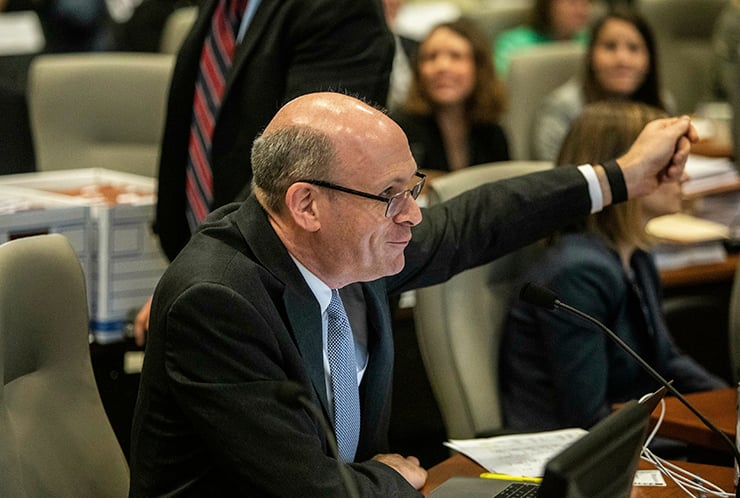When I ask Republicans what they think of Marc Elias, the Democratic Party’s most powerful lawyer, a series of harsh adjectives usually follows: “immoral,” “ruthless,” “sleazy,” and so on. All these are true. But he is also extremely effective. Thus, there is a follow-up question: why doesn’t the right have a Marc Elias, and shouldn’t we want one?
Elias is a stone-cold partisan leading a crusade against Middle America. It is hard to think of a single more consequential Democrat. He became a go-to lawyer for Democratic Party after he successfully represented Al Franken in the 2008 recount of the Minnesota Senate race. He dramatically expanded his portfolio to include redistricting disputes, campaign finance law, and “voting rights protection.”
In 2016, armed with a multi-million-dollar commitment from George Soros, Elias waged war against Republican-initiated voting laws that he said “hurt his party’s most loyal constituencies,” according to The Washington Post. Michael Vachon, a spokesman for Soros, told the Post that Elias came to the Soros group with a handful of “proposals for challenging state restrictions that would be helpful ‘up and down the ballot.’” Vachon said, “That was appealing to Soros, who began his political giving with voter mobilization efforts. … And they agreed with Elias that there was work to be done beyond what the civil rights groups, to which Soros also contributes, were doing.” Elias likes to couch his activities in the language of civil rights, so the alliance with the liberal billionaire was a match made in Hell.
While serving as the head of the political law practice at Perkins Coie, Elias played a key role in producing and disseminating the salacious Steele dossier at the center of the Russian collusion hoax. With money from the Clinton campaign and the Democratic National Committee, Perkins Coie hired Fusion GPS, which, in turn, paid Christopher Steele, a former British intelligence officer with ties to the FBI and the U.S. intelligence community, to conduct research that resulted in the dossier. But that was just the beginning of Elias’s war on the America First movement.
RealClear Investigations reported that, in 2020, Elias “represented the Democratic National Committee, state Democratic parties, congressional Democrats, and activist groups such as Priorities USA, bringing more than 200 pre-election lawsuits.” His team fought against restrictions on absentee ballots and for the expansion of mail-in voting, bringing clear benefits to Democratic candidates.
After the 2020 election, he spearheaded over 60 legal victories against Trump’s efforts to contest the results in different states. The one small case Elias lost was later overturned in his favor by Pennsylvania’s Supreme Court.
The following year, Elias, stalwart defender of democracy, attempted a legal challenge to have Rep. Mariannette Miller-Meeks (R-Iowa) removed from office, ironically, by undoing the certified Iowa election. He claimed that his client, Rita Hart, had actually won after a handful of extra ballots mysteriously materialized. Apparently, decertifying elections is fine, depending on who benefits from it.
Conservatives have a habit of following pied pipers like Sidney Powell in search of “Krakens”—vast conspiracies of complicated corruption. The eventual failing of such pipedreams seems only to reinforce a sense of powerlessness in those who were taken in. The real answer, however—at least in this case—can be much simpler: people like Elias, with the will and wherewithal to consistently achieve more modest legal victories, can change the trajectory of American politics.
To be sure, the right has legal firepower in its corner, too, in organizations such as Judicial Watch and the Alliance Defending Freedom. These legal advocacy groups labor tirelessly against the likes of Elias, often without media coverage or even support from other purportedly conservative groups.
Nevertheless, much of what the right generally does is reactive, reeling in response to some abuse and defending itself, whereas the left is typically proactive, on the attack against the right. This difference in approaches may be understandable because the right does not have institutional support—it is on the “outside” of American political life. But one would think, on the other hand, that such a position might encourage the right to focus on offense instead of fighting rearguard actions.
Perhaps at the heart of the Elias phenomenon is something the right does not want to think about. Perhaps the right is haunted by what Nietzsche called a slave morality, one that ties its hands behind its back under the assurance that in meekness and fairness there is virtue. That might be true outside of politics, in our daily life with friends and loved ones—even perhaps with our personal enemies—but whether people like Elias are “good” or “bad” is ultimately irrelevant within the context of contemporary politics. There is very little virtue in losing with one’s lofty sense of morality intact if that loss entails the destruction of what is good in life outside of politics.
For the greater good, in other words, winning is important. Yes, Elias may be immoral, ruthless, and relentless—but he wins because he knows how to be effective, which is what the right needs to become.
Image: Marc Elias, an attorney for Democratic congressional candidate Dan McCready, questions a witness during a hearing about voting irregularities during the 2018 North Carolina election. Due in part to Elias’s efforts, Republican Mark Harris’s narrow victory was overturned. (The News & Observer / via Associated Press)

Leave a Reply